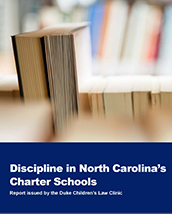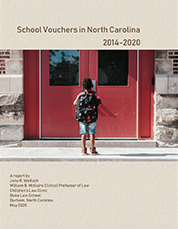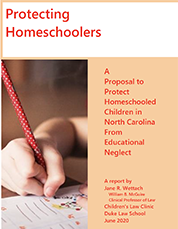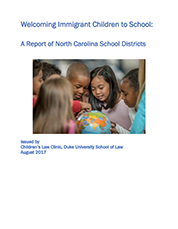Resources and Links
The Children’s Law Clinic, in partnership with staff and parent researchers of the Education Justice Alliance (EJA), released a report on the use of early grade suspension in North Carolina. Early grade suspension is the practice of suspending young children from school for disciplinary reasons. Each year, North Carolina public schools suspend thousands of young children in pre-Kindergarten through 2nd grade despite no evidence that shows these suspensions are effective at stopping misbehavior or making schools safer. These suspensions can have long-term negative impacts on young children and disproportionately impact vulnerable groups, including Black and Native children and children with disabilities.
The report (Community Report: Too Young To Suspend) examines the practice of suspending young children in North Carolina, summarizing research on the practice, highlighting local and statewide suspension data for K-2nd grade students, and reviewing the perspectives of directly impacted parents. The report also looks at policy efforts by states and local school districts to limit the use of early grade suspension. Finally, the report outlines overall findings and recommendations for reducing early grade suspension in North Carolina, emphasizing the importance of community involvement and ongoing data collection, monitoring, and oversight.
This report was made possible thanks to generous funding from The Duke Endowment, the Duke Office of Durham & Community Affairs, the Duke School of Medicine and the School of Nursing, and the Duke Office of the Provost.
The Children’s Law Clinic has released a new report that sheds light on discipline trends in North Carolina’s charter schools. The report, which is the first of its kind to focus specifically on charter school discipline in the state, revealed several key findings relating to the use of suspension among charters. It also uncovered correlations between the racial demographics of charter schools and their use of suspension. Clinic students Ryan Yang ’21 and Richard Yang ’22 drafted the report under the supervision of Supervising Attorney Peggy Nicholson.
The Children’s Law Clinic has released a report, School Vouchers in North Carolina, 2014 – 2020. It presents a detailed six-year review of the program, which provides taxpayer-funded scholarships to low and moderate-income students to assist with the payment of tuition at private schools. Included are up-to-date facts and figures about the cost, participation, academic outcomes, and evaluation of the program, as well as a program analysis and recommendations. The report points out the success of the program in providing a government subsidy to parents who prefer religious education for their children, but also reveals that the program has no accountability to the taxpayers who fund it. Due to the program’s design, the public has no window into whether the voucher program promotes academic progress or leaves the participating children far behind those who attend public schools.
Most homeschooled children in North Carolina get a good education from their parents. A few don’t. Under the current state law, those homeschooled whose education is neglected by their parents have no protection. This report, Protecting Homeschoolers, makes a modest proposal for a law change to protect homeschooled children in North Carolina from educational neglect.
The Duke Children’s Law Clinic has produced a comprehensive Guide for parents of children with special education needs. The Guide explains the special education law in clear terms so that parents can learn the vocabulary, navigate the special education system, and become an effective advocate for their children. The Guide is especially geared to assist North Carolina parents.
This report, issued by the Children’s Law Clinic, documents the practices of school districts in North Carolina as they affect the enrollment of immigrant children in the public schools. While the law is clear that immigrant children who live in North Carolina, including undocumented immigrant children, have a constitutional right to attend public school, our research showed that not all public school districts are meeting their obligations to facilitate the enrollment of immigrant children.
Resources
- Bullying in School: A Parent’s Guide to NC Law
- Report on Characteristics of North Carolina Private Schools
- Watch Parent-to-Parent: Navigating Special Education for Your Child
- Educational Rights of Children
- Brief Summary of Education Rights of Children with Disabilities
- Preparing for Special Education Mediation and Resolution Sessions: A Guide for Families and Advocates
- Section 504
- A Handbook for Parents/Guardians and Students in NC Public Schools
- An Introduction for Parents to the Special Education Process
- The School-to-Prison Pipeline
- Instead of Suspension: Alternative Strategies for Effective School Discipline
- What Everyone Ought to Know about Suspension and Expulsion in North Carolina Public Schools
Links
North Carolina Department of Public Instruction
- N.C. Department of Public Instruction: http://www.dpi.state.nc.us/
- N.C. Department of Public Instruction Exceptional Children’s Division: http://ec.ncpublicschools.gov/
- N.C. Handbook on Parents Rights: Information on the rights of parents with children who have disabilities: https://www.dpi.nc.gov/media/11182/download
School Systems in the Clinic’s Service Area
- Alamance-Burlington School System: http://abss.k12.nc.us/
- Caswell County Schools: http://www.caswell.k12.nc.us/
- Chapel Hill-Carrboro City Schools: http://www.chccs.k12.nc.us/
- Chatham County Schools: http://www.chatham.k12.nc.us/
- Durham Public Schools: http://www.dpsnc.net/
- Granville County Schools: http://www.gcs.k12.nc.us/granville/site/default.asp
- Franklin County Schools: http://www.fcschools.net/
- Orange County Schools: http://www.orange.k12.nc.us/
- Person County Schools: http://www.person.k12.nc.us/
- Vance County Schools: http://www.vcs.k12.nc.us/
- Wake County Public Schools: http://www.wcpss.net/index.html
- Warren County Schools: http://www.warrenk12nc.org/
Support & Information for Parents and Advocates
- LD Online: information on learning disabilities: http://www.ldonline.org/
- Learning Disabilities Association of America: National volunteer organization that advocates for individuals with learning disabilities: https://ldaamerica.org
- National Center for Learning Disabilities: A national organization to support people with learning disabilities: http://www.ncld.org/
- Wrightslaw: Legal information and advice for parents and advocates: http://www.wrightslaw.com/
- Office of Special Education Programs, U.S. Department of Education: http://www.ed.gov/about/offices/list/osers/osep/index.html?src=mr
- Clinical Center for the Study of Development and Learning (at UNC): State organization that works closely within communities to provide support for people with developmental disabilities and their families: https://www.cidd.unc.edu
- CHADD: Children and Adults with Attention Deficit/Hyperactivity Disorder: http://www.chadd.org/
- Autism Society of North Carolina: http://www.autismsociety-nc.org/
- Attention Deficit Disorder Association: http://www.add.org/
- All Kinds of Minds: A non-profit institute for the understanding of differences in learning: http://www.allkindsofminds.org/
- The ARC of North Carolina: Association dedicated to improving the quality of life and increasing choices for people with disabilities: http://www.arcnc.org/
- Center for Exceptional Children: International professional organization dedicated to improving education for students with disabilities and giftedness: http://www.cec.sped.org/
- The United States Department of Education, IDEA 2004: www.idea.ed.gov
- Family Support Network of North Carolina: Organization that provides support for families with children who have special needs:
http://www.fsnnc.org/ - Exceptional Children’s Assistance Center (ECAC): A free training and assistance center for parents of children with disabilities:
http://www.ecac-parentcenter.org/ - Special Education Guide: A comprehensive website with information about special education: http://www.specialeducationguide.com/
- College Resource for Students with Disabilities: https://study.com/resources/college-resource-for-students-with-disabilities
Advocacy Organizations
- The Center for Law and Education: A national organization working to bring about change in order to improve the education of low-income students: http://www.cleweb.org/
- Council of Parent Advocates and Attorneys: A national organization that promotes collaboration between parents and educators with the goal of improving education for children with disabilities: http://www.copaa.net
- Disability Rights North Carolina: A private, nonprofit organization offering legal representation to persons with disabilities in North Carolina: http://www.disabilityrightsnc.org/
Laws Affecting Children with Disabilities
- Individuals with Disabilities Education Act (IDEA) – 20 U.S.C. 1400 through 20 U.S.C 1409: Federal law governing the education of children with disabilities:
https://sites.ed.gov/idea/ - Federal Regulations implementing the Individuals with Disabilities Education Act:
https://www.dpi.nc.gov/districts-schools/classroom-resources/exceptional-children/federal-regulations-state-policies - Early Intervention Program for Infants and Toddlers with Disabilities – 34 CFR Part 303:
https://sites.ed.gov/idea/regs/c - North Carolina Policies Governing Services for Children with Disabilities:
http://ec.ncpublicschools.gov/policies/nc-policies-governing-services-for-children-with-disabilities - North Carolina General Statutes Chapter 115C: State law governing the education of children with disabilities:
http://www.ncga.state.nc.us/EnactedLegislation/Statutes/HTML/ByArticle/Chapter_115C/Article_9.html






